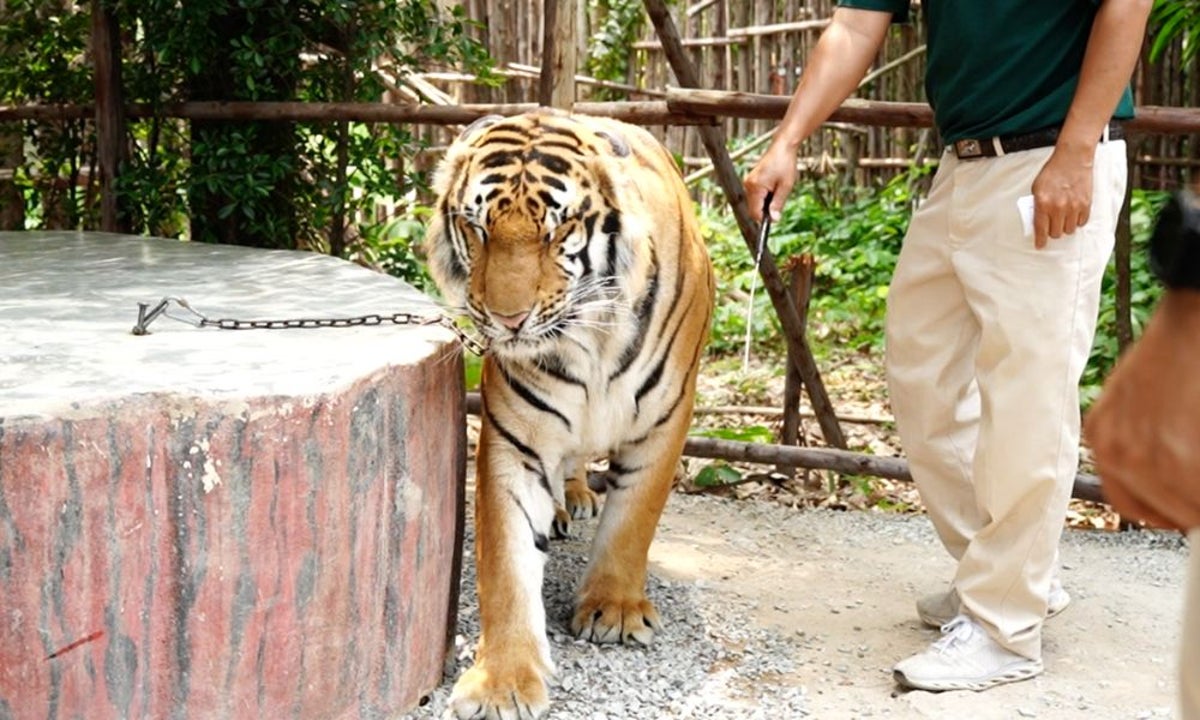Inside Thailand’s ‘rampant’ tiger cruelty as animals are abused for selfies with tourists


A new undercover investigation of Thailand zoos shows abuse of tigers for tourist selfies is still “rampant”, a charity has said.
While concerns about the treatment of big cats in the country have been raised for years, animal rights campaigners Lady Freethinker (LFT) said they found cruelty against ‘photo-prop’ animals in recent visits to 11 zoos across Thailand.
Tigers having lighter flames put under their noses so they would lift their heads for pictures is a form of abuse that has never been filmed before, according to LFT, who shared the footage with The Independent.
Big cats having lighter flames forced under their nostrils to lift their heads so tourists can pose with them in photos is one of many instances of “rampant” abuse across Thai zoos
(Lady Freethinker)
Elsewhere they found animals were whipped, with tigers, lions and ligers seen tightly chained by the neck to concrete slabs. Tigers were documented pacing back and forth in barren, concrete enclosures with murky green water.
Lady Freethinker is now launching a petition urging Thailand to end the cruelty and has sent a letter to Thai officials pleading with them to ban forced photo ops immediately.
“I’ve never seen abuses of this level or an investigation that’s quite so comprehensive,” said Nina Jackel, founder and president of Lady Freethinker. “We covered 11 zoos all across the country, showing the extent of the problem and a level of cruelty that has not been shown before.
“To our knowledge, we are the first group to expose the animals having lit lighter flames shoved under their noses, as well as the first to expose the animals being hit repeatedly with long sticks at these facilities, including in the face.”
The organisation’s investigator visited 11 zoos across Thailand in March, exposing cruelty against these so-called photo-prop animals at every location
(Lady Freethinker)
The rise of social media platforms and the “very widespread” fashion for taking ‘selfies’ have been blamed for increasing animal abuse worldwide, with Elisa Allen, PETA Vice President of UK Programmes & Operations, telling The Independent: “The quest for a ‘cute’ selfie or a few ‘likes’ on social media has fuelled a lucrative worldwide market of exploitation and cruelty.”
She cited the example of Tiger Temple in Western Thailand, which was reportedly bringing in $6 million a year from ticket sales before it was shut down following years of allegations of illegal breeding and trafficking in the endangered cats.
The undercover investigator said witnessing the abuse left them in tears
(Lady Freethinker)
Tigers are an endangered species with only 148 to 189 wild tigers left in all of Thailand, according to the World Wildlife Fund (WWF). The Environmental Investigation Agency (EIA) estimated that there were at least 1,962 captive tigers in over 63 facilities in the country in 2019, its latest figures.
Ms Allen described distressing conditions similar to those exposed in LFT’s investigation that animals used for ‘selfies’ endure, adding: “Handling by the public subjects animals to stress, puts them at risk of injury, and can facilitate disease transmission between them and visitors.”
Tigers were captured cowering in fear when handlers raise their fists – all so holidaymakers can take a selfie with the animals
(Lady Freethinker)
She told of vulnerable infants “prematurely torn away from their mothers” and “forced to work all day without food, water, or rest” for photo ops. Then, when the animals become too old to be exploited as petting props, “many are slaughtered and used to make tiger wine”, which is made of their soaked remains.
LFT’s investigator, who asked to remain anonymous for safety reasons, told The Independent witnessing the abuse when they visited the zoos in March left them in tears. It was “really hard to see” and “so much worse” in some places than they expected.
The Environmental Investigation Agency (EIA) estimated that there were at least 1,962 captive tigers in over 63 facilities in the country in 2019, its latest figures
(Lady Freethinker)
They confirmed they visited zoos in every part of Thailand and so believed that what they witnessed at the 11 locations “represents very well the situation of tigers around the country”.
Ms Allen described tiger abuse as “rampant” throughout Thailand and other parts of Asia, with the trend of taking ‘selfies’ with these animals being “very widespread”.
The investigator said they saw up to two hundred tourists at one zoo they visited.
“Behind every photo op or selfie with a tiger is a lifetime of deprivation and misery,” said Ms Jackel. “There is no such thing as a zoo with big cat selfie ops that does not have some type of cruelty.”
Big cats were documented pacing back and forth in barren, concrete enclosures with murky green water
(Lady Freethinker)
However, Ms Allen did give reason for hope.
“Public opposition to the use of wild animals for entertainment is stronger than ever and continues to grow as this seedy exploitative industry, of which the infamous Tiger King series is a widely known product, is increasingly exposed.,” she said.
Big-cat exhibitors and cub-petting interactions are “becoming less and less acceptable to the public”, according to Ms Allen, who cited positive examples like travel companies no longer promoting operations offering interactions with wild animals.
But she said there is “still much work to be done” and “it’s high time to move ahead”.
Ms Allen said: “Wild animals will continue to suffer in these ways as long as people pay for photo ops with them. PETA advises those who are lucky enough to see wild animals in their natural homes to leave them in peace. We also ask people to refuse to buy tickets for photo ops with live animals and to tell everyone they know to do the same.”
The Independent has approached the Thai government for comment.




